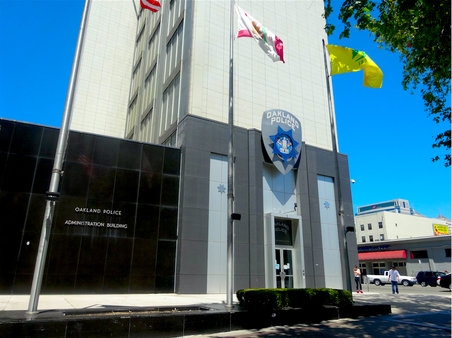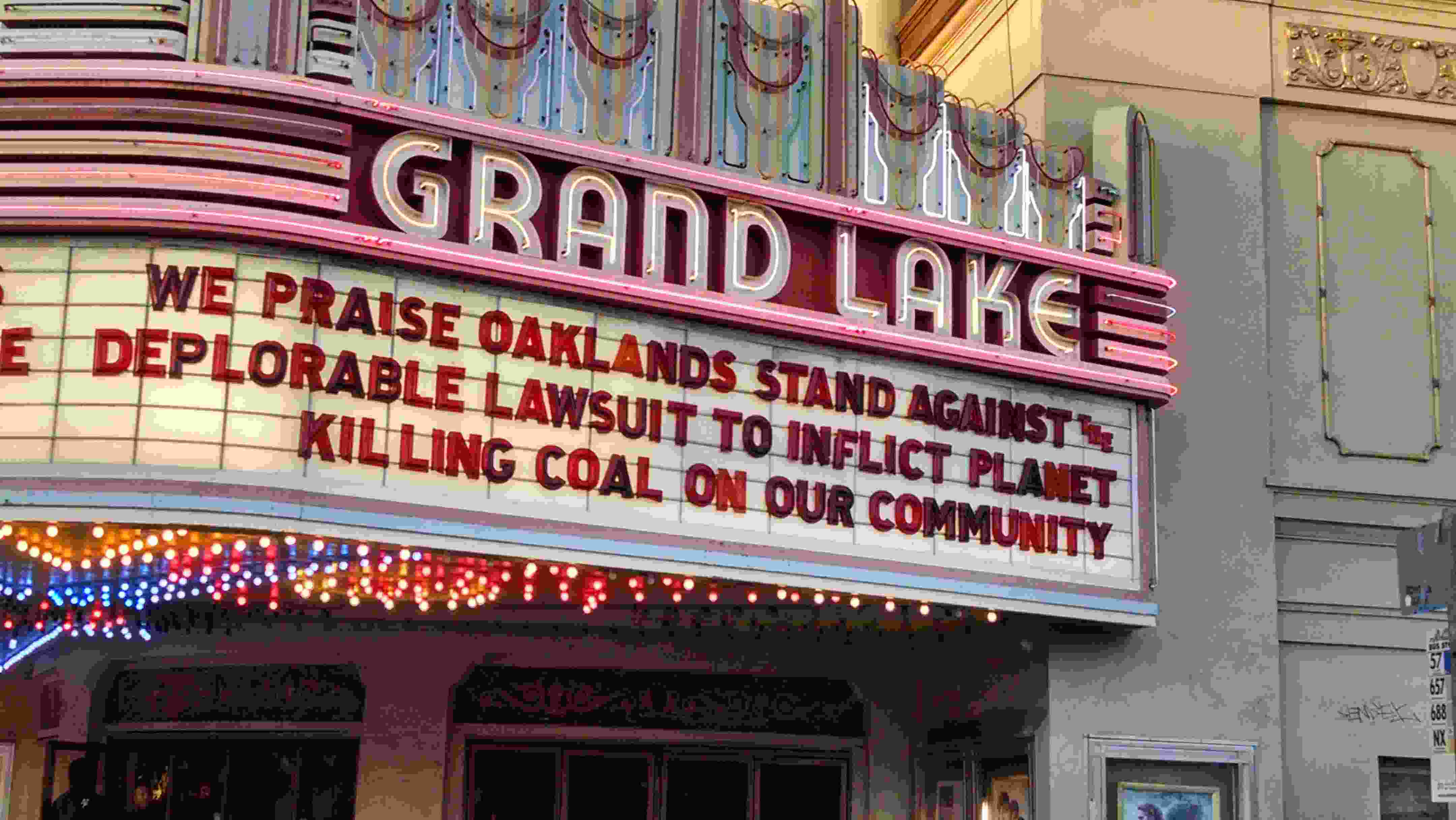0 Comments
Lieutenant allegedly being investigated for losing cocaine, heroin more than decade ago. The Oakland Police Department's Police Administration Building The Oakland Police Department's Police Administration Building According to multiple sources close to the Oakland Police Department, another investigation has been opened into sexual misconduct involving officers. This time, a young officer assigned to a crime-reduction team has been accused of using a room in the downtown Police Administration Building’s basement to have sex with an outside civilian. However, in the course of investigating this allegation, officers searched part of the basement and found a large amount of illegal drugs in a locker. Sources (who asked not to be identified because they did not have permission to speak to the media) described the drugs as an "alarming quantity" of cocaine, heroin, and marijuana. One source said "multiple pounds" of drugs were in the locker and estimated a street value of more than $100,000. A lieutenant assigned to the department’s internal-affairs division is reportedly under investigation for the stash of contraband; the drugs were somehow traced back to the lieutenant. It’s unclear at this time if the seal of the packaging was broken or if anyone had tampered with the drugs. The cocaine, heroin, and marijuana allegedly were checked out from OPD’s crime lab more than a decade ago, in 2005, for a training exercise by the lieutenant, who was an officer at the time. Sources didn’t speculate on what happened to the drugs during the past twelve years, or why such a large quantity was permitted to be borrowed — and then left in a locker that apparently wasn’t checked for such a long period of time. The officer under investigation was later promoted and currently works in internal affairs, the division responsible for probing cop misconduct. According to sources close to OPD, the allegations constitute at least a level-two violation of Department General Order H-7: “Withdrawing, Viewing and Returning Evidence.” If this violation is upheld it could result in suspensions. Little is known about the sexual-misconduct case that led to the drug discovery, but OPD's spokesperson Officer Johnna Watson said the discovery of the drugs was actually unrelated. She wrote in an email that the drugs were found during the cleaning of an office. Watson described the location of the drugs as being inside a "locked cabinet," not a locker. She confirmed there's an investigation into the matter. The administration building’s basement includes a shooting practice range, which is used as a virtual gun-and-weapons simulator, and also features several other rooms. This isn't the only headache OPD’s facing: On June 24, Richmond police arrested a young OPD officer, Marcos Gocobachi, and booked him at the Contra Costa County jail in Martinez for domestic violence, according to Lt. Felix Tan, of the Richmond Police Department. https://m.eastbayexpress.com/oakland/new-oakland-police-sexual-misconduct-case-leads-to-discovery-of-drugs-stashed-in-locker/Content?oid=7726703
Official: Oakland Mayor Bungled Police Sex Misconduct Probe
The city’s process for selection of developers for city-owned property is not open and transparent.6/20/2017 CONCLUSION
While the Grand Jury only investigated three recent city development projects, it is concerned that the city’s misuse of closed sessions in discussing development of city property is a systemic problem. Public deliberations are important. The city must provide an environment whereby public participation in developer selection is invited. In addition, developers must believe that they will be treated fairly and equitably, thus promoting a competitive selection process benefiting the city. The city must follow open meeting laws to prevent further misuse of closed session meetings and eliminate the inequities in the developer selection process. FINDINGSFinding 17-1: The Oakland City Council misapplies the real estate negotiation exception to the openmeeting requirements of the Brown Act and the Oakland Sunshine Ordinance, thereby shielding the deliberative processes – including discussions and debates regarding project vision, project scope, feasibility issues, community benefits, and the ultimate selection of a developer – from public scrutiny. Finding 17-2: The city’s closed session agendas for discussions of the 1911 Telegraph and 12th Street Remainder projects did not comply with disclosure requirements in the Brown Act and the Oakland Sunshine Ordinance. Finding 17-3: The Oakland City Council violates the city’s Sunshine Ordinance by failing to discuss publicly the advisability of selecting particular developers for projects on city-owned property before making final decisions (section 2.20.120(B)) and failing to disclose the parts of closed session discussions that were not confidential (section 2.20.130). Finding 17-4: Unauthorized closed sessions prevent the public from witnessing council deliberations, preclude public input into planning, and restrict public participation in the selection of appropriate developers for city-owned property. Finding 17-5: The city of Oakland unfairly applied the requirements of its RFP for 1911 Telegraph by allowing the successful proposer to wait until after it was chosen to provide required financial information. Finding 17-6: A developer was allowed to change the scope of its proposal for 1911 Telegraph at the last minute. This put the other proposers at a disadvantage, and resulted in the city choosing that developer without the benefits of staff analysis of the new proposal Finding 17-7: Oakland City Councilmembers privately discuss projects with developers whose proposals are pending, and the communications are not disclosed publicly before one developer is selected. This compromises public scrutiny of the selection process because citizens have no ability to assess the strength or weakness of private arguments made by developers in support of their proposals. RECOMMENDATIONSRecommendation 17-1: The city of Oakland must comply with the Brown Act and city of Oakland Sunshine Ordinance provisions relating to the real estate exception. The city must limit closed session discussions concerning proposed real estate development projects to price and terms of payment, and ensure that deliberations on matters such as project vision, project scope, feasibility issues, community benefits, and selection of a developer are conducted openly, allowing the public to be informed about and comment intelligently upon proposals for use of city-owned property. Recommendation 17-2: The city of Oakland must follow its Sunshine Ordinance by conducting open meetings in which councilmembers discuss publicly the advisability of any proposed disposition of city-owned property before making final decisions. Recommendation 17-3: The city of Oakland must update its training for public officials on open meeting laws to prevent the city from misapplying the real estate negotiation exception. Recommendation 17-4: The city of Oakland must enforce requirements of its RFPs even-handedly to create a level playing field for all proposers, and to allow city staff a full record with which to vet competing proposals. Recommendation 17-5: The city of Oakland must treat developers who respond to an RFP equitably by informing all RFP respondents whether changes to proposals after the submission date are permitted. Recommendation 17-6: The city of Oakland must adopt rules to address private communications between councilmembers and proposing developers before a developer is selected. RESPONSES REQUIRED
City’s forces bolsteredOn Tuesday, June 6, United States District Judge Vince Chhabria granted Sierra Club and San Francisco Baykeeper’s motion to intervene in developer Phil Tagami’s lawsuit against the City of Oakland. The lawsuit challenges the City’s ban on coal storage and handling at a marine terminal to be located on the City’s West Gateway waterfront property near the foot of the Bay Bridge. The move granting intervenor status was foreshadowed by comments Judge Chabbria made at a hearing on April 20, but, until Tuesday’s written order, the environmental groups did not know for sure if they would be parties in the lawsuit with the power to take discovery, bring and oppose motions, and participate at trial. “No Coal in Oakland is encouraged that the City of Oakland will have the support of a gifted team of environmental lawyers representing two of our allies in the struggle to keep coal out of Oakland,” commented Michael Kaufman on behalf of NCIO. Although intervenor status will enable Sierra Club and Baykeeper to participate fully in defending the City against the developer’s claims, the judge’s long-awaited order stated they will not be able to prevent the case from being dismissed if the developer and the City reach a settlement. Motions to dismiss deniedTuesday’s order also denied two separate motions to dismiss claims in the lawsuit, one motion brought by the City and another by Sierra Club and Baykeeper. A motion to dismiss can only be brought at the beginning of a lawsuit. In it, a defendant argues that, even if all the facts stated in the plaintiff’s complaint are true, the claim is not valid. The defendant can make legal arguments based on the plaintiff’s version of the facts, but, with few exceptions, cannot introduce facts to contradict the defendant’s claims. The City’s motion to dismiss sought dismissal of the developer’s breach of contract claim. OBOT, Tagami’s company, contends that, by banning coal storage and handling in 2016, the City of Oakland breached its 2013 Development Agreement (DA), which OBOT claims gave it a vested right to build and operate a bulk commodities terminal at the West Gateway site under the regulations as they existed at the time of the agreement. Breach of contractn its motion to dismiss the breach of contract claim, the City argued that, the DA gave OBOT a vested right to develop and operate a bulk commodities terminal at the West Gateway site, but no vested right to operate a coal-handling terminal. Oakland’s attorneys argued that the right to handle coal at the terminal needed to be “expressly” stated in the agreement, Judge Chhabria called the City’s argument a “strawman” and agreed with the developer that the point is not whether OBOT had an expressly stated right to build a coal terminal but rather that it had a right to build a terminal under the City’s regulations as they existed in 2013, which did not exclude storage and handling of coal. “If the City wanted to restrict the developer to an approved list of commodities – or to foreclose the handling of a particular commodity such as coal – it should have included language to that effect in the Development Agreement,” Judge Chhabria explained. The judge’s rejection of the City’s motion does not mean the developer’s breach of contract claim will succeed, but merely that it has survived the City’s first attack. The decision went on to note that “section 3.4.2 of the Development Agreement provides that the City may impose a new ordinance if failing to do so would place neighbors of the development ‘in a condition substantially dangerous to their health or safety.’” Before the City adopted the ban on coal, it followed the provisions of section 3.4.2 which required it to hold a public hearing and gather substantial evidence to support the finding of a risk to health or safety. The City held an extensive public hearing that began with one of the longest City Council meetings in history on September 21, 2015 and ended nine months later with a final hearing on June 27, 2016. During the course of its inquiry into the health and safety risks involved in the transport and handling of coal in Oakland, the City received thousands of pages of scientific reports, comment letters, and other documents from advocates favoring or opposing coal. The developer contends that the City’s process was a “sham” and the evidence against coal does not meet the standard set forth in the DA. Judge Chhabria did not rule on the merits of these assertions, but rather ruled that “whether this ‘health and safety’ exception applies here is a question that can’t be answered on a motion to dismiss” which looks only at whether the lawsuit might succeed if the facts in the complaint are all true. Judge Chhabria explained that “both the ‘substantially dangerous’ standard and the City’s satisfaction of its procedural obligations are matters that call for factual development.” Thus, the contract claim will be open for discovery (including depositions, document requests, and interrogatories) and will be resolved at summary judgment or trial, which is set for January 16, 2018. A motion for summary judgment avoids trial on some or all of the claims in a lawsuit. Unlike a motion to dismiss, a summary judgment motion can present factual evidence including testimony and documents obtained through discovery as well as declarations. Either side can bring a motion for summary judgment on some or all of the claims in the case prior to trial. Commerce Clause claimThe judge also rejected Sierra Club and San Francisco Baykeeper’s motion to dismiss the developer’s claim that the City’s ban on coal storage and handling violates the Commerce Clause of the United States Constitution either by discriminating against out-of-state economic interests in favor of in-state interests or by posing an “undue burden” on interstate commerce. The judge held that OBOT’s “undue burden” theory was sufficiently well supported in its complaint to defer any decision on it at least until summary judgment at which point the City and intervenors will be able to submit facts to undermine it. The judge acknowledged that the discrimination claim was “substantially weaker, both conceptually and in terms of the facts alleged to support it,” but saw no practical value in striking it down as discovery into the different versions of the Commerce Clause claim would likely overlap. Again, as with the rejection of the City’s motion to dismiss, the court’s denial of Sierra Club and Baykeeper’s motion is not a decision on the merits. In order to prevail, the developer will have to prove its case. The judge’s comments on the interstate commerce discrimination theory suggests it is unlikely to survive summary judgment. Although Oakland’s effort to maintain a clean and healthy environment in West Oakland and prevent the burning of massive amounts of coal overseas may impact Utah’s coal industry, the developer has not explained how this shows an intent to discriminate against businesses from Utah in favor of local businesses. The complaint does not identify any in-state economic interests that will benefit from the ordinance. In order to prevail on the “undue burden” theory, the developer will have to show that the burden imposed on interstate commerce posed by the ban on coal storage and handling is “clearly excessive” in relation to the purported local health and safety benefits. Generally, courts will uphold even burdensome regulations enacted in the interest of local health and safety so long as they are not pretextual or flimsy. Current situationAccording to NCIO’s sources, the City and developer are pursuing ongoing negotiations at the same time that the litigation is moving into a phase of intensive discovery in preparation for trial.
The environmental groups are represented by Colin O’Brien, Adrienne Bloch, and Heather M. Lewis of Earthjustice. Sierra Club is also represented by Jessica Yarnall Loarie, Joanne Spalding, and Daniel P. Selmi of Sierra Club. The City of Oakland is represented City attorneys Barbara J. Parker, Otis McGee Jr., and Colin Troy Bowen and by Kevin D. Siegel, Gregory R. Aker, and Christopher M. Long of Burke Williams & Sorensen LLP. OBOT is represented by Robert P. Feldman, David Myre, and Meredith M. Shaw of Quinn Emmanuel Urquhart & Sullivan LLP. |
Gene HazzardDon't Be Envious of Evil Men Archives
June 2024
Categories
All
|
||||||||||||||||||||||||||||||||||||
- Home
- Sanjiv Handa
- Gene's Blog
- Rotunda RFP
- Gene Hazzard -Keeping eyes open
- Chronology of Tagami's scheme of Private-Public Partnership with City Projects
- Another Tagami scheme - Rotunda Building deal
- Oakland Army Base
- Billboards in Oakland
- Port of Oakland
- Oakland Raiders?
-
Who is running Oakland?
- Jerry Brown
- Don Perata
- Judge Robert B. Freedman
- Jacques Barzaghi
- Gawfco Enterprises
- Deception
- Doug Bloch
-
Phil Tagami
>
- SF Business Times November 20, 2005
- Rotunda wrestling
- A conversation with Oakland developer Phil Tagami
- Audit of $91 million Fox Theater project
- Tagami Conflict
- CCIG Response to Oakland Works
- Oakland developer Phil Tagami named to state medical board
- ‘Shotgun Phil’ hits another bullseye — with governor’s help
- CleanOakland Store
- CenterPoint Properties



 RSS Feed
RSS Feed
